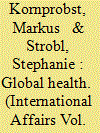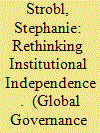| Srl | Item |
| 1 |
ID:
180376


|
|
|
|
|
| Summary/Abstract |
Do global health institutions keep up with globalization forces? We contend that they seriously lag behind. While medical knowledge becomes more and more refined in showing how diseases spread globally, the political order meant to address this problem is barely global. It is global in terms of the promises it makes in declarations and even legally binding instruments (institutional foreground). But many entrenched political practices of interaction do not keep these promises (institutional background). We explain this with the dominance of a traditional diplomatic ‘feel of the game’ in which often narrowly defined national interests, positioning battles among states, and a subordination of global health under considerations of international security and economics prevail. Based on this diagnosis, we discuss three scenarios for the further evolution of the global health order: (1) the persistence of current institutions, (2) revisions of the institutional foreground and persistence of the background, and (3) a qualitative break that makes amendments to both. While the COVID-19 crisis provides openings for the third and, even more so, the second one, the current upheavals in the liberal constellation of orders makes the first scenario the most likely one.
|
|
|
|
|
|
|
|
|
|
|
|
|
|
|
|
| 2 |
ID:
184097


|
|
|
|
|
| Summary/Abstract |
This article examines institutional independence using the examples of the World Health Organization (WHO) and of the Public Health Emergencies of International Concern (PHEIC s) in a theoretical and a practical approach. It highlights the two different sources of authority of the WHO Secretariat, based on conditional negotiated legitimacy and epistemologically derived legitimacy, and how this authority is threatened by an increase in state party influence beyond what is envisaged in the WHO’s institutional setup. As a practical example, the article uses the PHEIC determinations, when the criteria as set out in the International Health Regulations (IHR) are not sufficient to explain the director-general’s decision to determine a PHEIC. Instead, this article offers evidence of state party influence. This challenge to the WHO’s legitimacy leads to a lack of institutional independence and, subsequently, to a declining basis for cooperation.
|
|
|
|
|
|
|
|
|
|
|
|
|
|
|
|